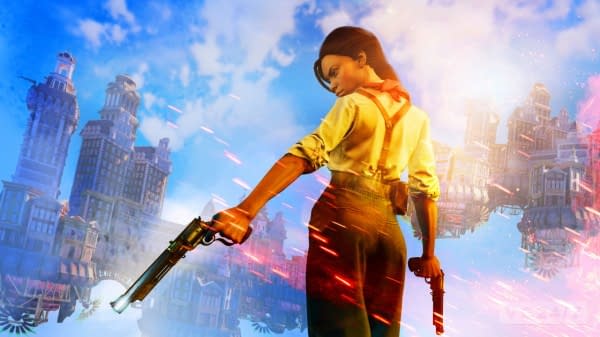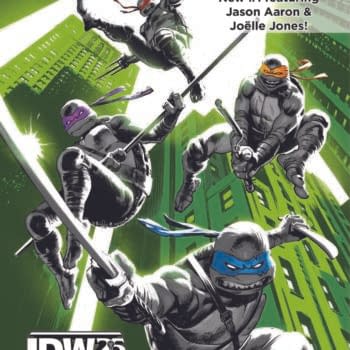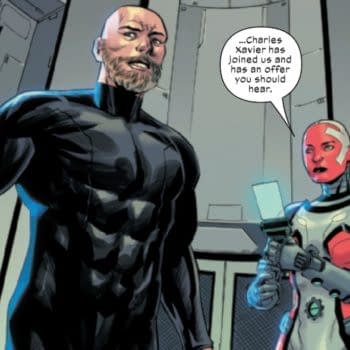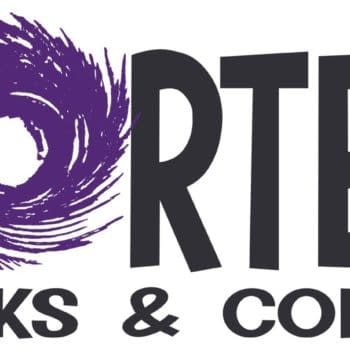Posted in: Comics, Look! It Moves! by Adi Tantimedh | Tagged:
Look! It Moves! by Adi Tantimedh: "There's Always A Man, There's Always A City…"
(WARNING: SPOILERS FOR BIOSHOCK 1 AND 2, AND MINOR SPOILERS FOR BIOSHOCK INFINITE)
BIOSHOCK INFINITE is the latest contender of Game As Art. It's certainly a must-play game for anyone interested in not just fun, but also how games tell stories, and what kinds of stories games can tell. Frankly, I don't care whether games are Art or not. What matters is what kind of impact their stories can have, and the BIOSHOCK series certainly try to do something to effect the players with their ideas and themes while using the framework of an elaborate First Person Shooter.
The basic structure and format of the games have been established now over three games: you play from the first person a man who has to fight the inhabitants of a city that's a failed utopia. The city itself embodies a particular ideology taken to extremes and proven untenable, has fallen, whose inhabitants driven mad and desperate and end up killing eat other as the ideological argument plays out to its endgame. Thus, in the first BIOSHOCK, it is the flaws of Randian objectivist ideals of Rapture that have collapsed in on itself, even its founder Andrew Ryan was forced to become a tyrant, having betrayed his beliefs to make deals with criminals to try to keep it going and thus damning the city and himself in the process. BIOSHOCK 2 takes place in Rapture once again (though not written or directed by KEN LEVINE), this time with a socialistic would-be despot having taken over the city and now the fallacy of enforced altruism and collectivity proven untenable and the inhabitants become desperate maniacs consuming each other in a grand conflagration. In BIOSHOCK INFINITE, it is the floating city of Columbia embodying an ideal of American exceptionalism with its obsession with White, Anglo-Saxon Protestant racial purity and xenophobia that becomes undone by a violent underclass revolution (modeled after the Russian Revolution, the historical touchstone for this kind of thing) whose raging participants kill everyone they consider in the middle and upper classes that exploited and abused them.
The BIOSHOCK games inspire passionate and heated debate because they are among the few games that deliberately dramatise ideological deconstruction and debate – you can't get more visceral than having to fight and kill armies of fanatics who represent the endpoint of a particular political viewpoint who are out to kill you because you clearly do not agree with them. You can't deny the scope of the series' ambition, with its meticulously-researched details in the art design and the lore.
And there is one common theme that has dominated the heart of all three games to date: that of fathers and daughters. In all three games, the protagonist you play ends up in a surrogate father-daughter relationship with young girls, and the games are suffused with the anxiety of fatherhood, of the fear of getting it wrong and the guilt of failing. In BIOSHOCK, the protagonist ends up leading a band of mutated "little sisters", children that have been genetically altered to become a source of supernatural power that everyone wants to harness. You get to choose whether he exploits them for their power or becomes their protector, with a different ending for each choice. The happy ending is one of redemption, of finding peace in fatherhood. In BIOSHOCK 2, the theme is taken further where a new protagonist has to protect a surviving Little Sister while facing a former Sister who has grown up and gone mad, becoming a monstrous Bad Daughter, and in the end, the surviving surrogate daughter will end up evil or good depending on your moral choices throughout the game.
In BIOSHOCK INFINITE, the central emotional theme is once again one of fatherhood as antiheroic protagonist Booker DeWitt has to get the young Elizabeth away from the clutches of the religious zealot leader of Columbia Zachary Comstock, who plans to indoctrinate her and use her powers for his planned revenge on an America he believes has gone soft and lost its way. It's a mythical battle for the soul of a young woman with Comstock being the Bad Father and the flawed DeWitt as the guilt-ridden father figure trying to right the wrongs inflicted upon her, including those he himself committed. Elizabeth becomes DeWitt's chance at redemption, and the story plays that thread out by combining the anxieties of Fatherhood with the labyrinthine workings of Quantum Theory that ends up becoming a metacommentary on not only moral choices but also the repeating motifs of games – and specifically the BIOSHOCK series – as a whole.
I shan't spoil the ending of BIOSHOCK INFINITE. The internet is already aflame with discussions and debates over what it really means, and you shouldn't go off and find out if you're playing the game. You need to experience the ending unspoiled before reading what other people are saying about it. What struck me about the theme of Fatherhood and Daughters is how emotionally charged it is, as lead designer Ken Levine must know since he went to great lengths to make Elizabeth feel as real as a videogame character could possibly be so that the player would become emotionally attached to her and thus feel the full weight of the emotional burden Booker DeWitt comes to experience as his relationship with her evolves in the story.
Why a daughter figure and not a son? Is it because a son feels like a young copy of the father while a daughter, being the opposite, carries a different emotional charge and comes to embody more vulnerability and thus allows a male player or audience member to deal more with his emotional and feminine side? I ask this because of the large number of father-daughter relationships popping up in games. Naughty Dog's upcoming THE LAST OF US also features an antihero protagonist protecting and guiding a young girl through an apocalyptic landscape (and coincidentally also played by BIOSHOCK INFINITE's lead voice actor Troy Baker). I suppose a boy is generally considered masculine and therefore predisposed to fight when a perilous situation arises. In conventional society, a girl is still considered vulnerable and to be protected, even if she's capable of taking care of herself as Elizabeth is and Ellis in THE LAST OF US is said to be, but the active fighter is still going to be the male protagonist while the girl plays a supporting role in the fights. Elizabeth is capable of ripping a hole into alternate universes, yet she doesn't actively fight. She provides Booker DeWitt with support, supplying him with ammunition, medicine and even extra cash. At a time when gender roles are being discussed in games, this adds another piece to the debate. Maybe it's part of empowerment fantasy of the Hero's Plot: to rescue the princess. And here, that princess might destroy the world.
When Elizabeth asks DeWitt, "Are you afraid of God?" He replies, "No, but I'm afraid of you." That answer may not just be about her power to tear holes in reality, but the general attitude of men toward the Feminine.
BIOSHOCK INFINITE is an amazing game, one of the must-play games of this year for what it does to push storytelling forward, and I'm not going to accuse it of sexism – it has enough complex female characters in it other than Elizabeth after all, including a woman leading the workers' revolution and a female scientist who invented the machinery that opened the riffs into other universes. What I find interesting is the way genre fiction – in both games and movies – use daughters as the shortcut to explore the emotional vulnerabilities of the male psyche as he ponders fatherhood. Notice how few movies and games feature a mother-son relationship at its core? And in the BIOSHOCK games, the father-daughter relationship is directly linked to sacrifice and mortality. That's the beauty of melodrama and fiction.
It's probably indicative of the gender politics of the games industry that it's highly unlikely anyone is going to make a AAA game about Motherhood, even though plenty of successful movies and TV shows have been made on the subject. It might be interesting to have a game where you play the heroic son of a heroic mother, though. That one's rare even in movies. I can only think of one example, and that's the Hong Kong martial arts comedy FONG SAI YUK starring Jet Li and Josephine Siao.
Still, food for thought.
Tempting infinity at lookitmoves@gmail.com
Follow the official LOOK! IT MOVES! twitter feed at http://twitter.com/lookitmoves for thoughts and snark on media and pop culture, stuff for future columns and stuff I may never spend a whole column writing about.
Look! It Moves! © Adisakdi Tantimedh

















